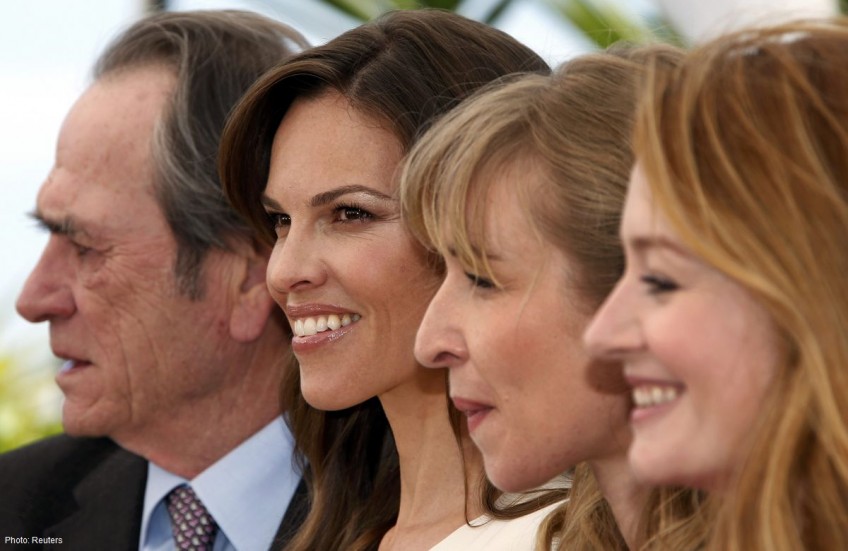Jones brings 'women's Western' with Swank, Streep to Cannes

CANNES, France - Tommy Lee Jones on Sunday premiered his Cannes contender "The Homesman", a women-driven Western starring fellow Oscar winners Hilary Swank and Meryl Streep that turns the genre on its head.
The film, which drew warm applause and largely positive reviews after a press preview, marked Jones's second directorial outing at the world's top film festival, following 2005's "The Three Burials of Melquiades Estrada".
Like that film, "The Homesman" takes a critical look at the defining narratives of US history including Manifest Destiny, the notion that Americans had a divine right and obligation to settle the continent.
Swank plays a pious unmarried woman who keeps a farm on her own in the Nebraska Territory in the 1850s.
Already 31, she is considered too old and "plain" to be wife material. In a humiliating put-down, a local yokel rejects her proposal of marriage, calling her "too bossy".
When the local pastor (John Lithgow) tells her about three women driven mad by the harsh life on the plains, she agrees to take them back East to a minister's wife (Streep, who did not attend the post-screening press conference) who will return them to their families.
Before she leaves, she comes upon an old boozer (Jones) perched on a horse who has been strung up with a noose for squatting another man's house. She agrees to cut him free if he'll accompany her on the dangerous journey to Iowa.
Loaded into the wagon are the three women who had gone West with their new husbands with the promise of prosperity and adventure but once settled, had their sanity stolen by tragedy, deprivation and violence.
Jones said the myths of American life were a driving issue behind the film, which he also co-wrote, including the white supremacy that fuelled the massacre of the native population.
"I won't try to hide the fact that a consideration of American imperialism on the west side of the Mississippi... was the underlying theme," he said.
'Objectified or trivialised'
He said women had paid a high price as part of that history, which he described as "the origin of the female condition today".
"I don't think there's a woman in this room who's never felt objectified or trivialised because of her gender. There's a reason for that, there's a history of that, and I think that's an interesting thing," he said.
"The journey in this movie is the inverse of what you usually see in a movie that has wagons and horses in it. The subject matter is women, insane women, and so-called heroic men."
Reprising his irascible screen character, Jones often bristled at reporters' questions, snapping at one point "I don't know what 'genre' means" when asked about his unconventional take on the Western.
Swank, who picked up Academy Awards for her roles in "Boys Don't Cry" and "Million Dollar Baby", said she was eager to play another "intense, strong" woman.
This is a film about "ultimately, how much a person can take," she said.
Reviewer Peter Bradshaw of London's Guardian called the film "hugely watchable and enjoyable" while Canadian critic Cedric Belanger hailed Swank's performance as "excellent": "It's not a Palme d'Or but a pleasant two hours of cinema," he said, referring to the top prize at Cannes.
"After Clint Eastwood's farewell to the genre in 'Unforgiven', Tommy Lee Jones is among a handful of actor/directors (Kevin Costner, Robert Duvall etc) who still believe in the Western and have the clout to make films in that genre," Britain's Screen Daily said, calling it "beautifully crafted".
Michael Phillips of the Chicago Tribune said "The Homesman" was "not up to (Jones's) superb 'Three Burials' but worth seeing".
"Though it falls through on its feminism by keeping the focus on Jones rather than Swank, it's nevertheless fairly effective, and does pack a real punch by the end," US movie website Indiewire concluded.